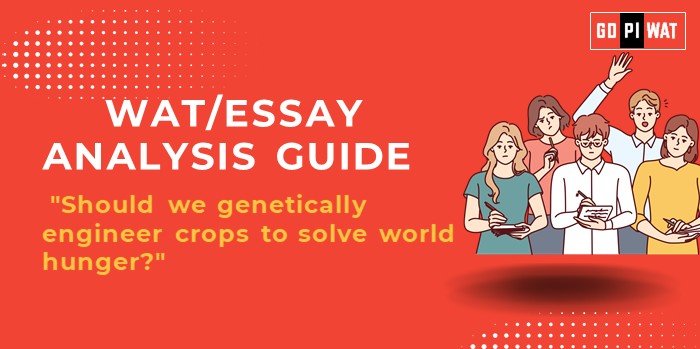📋 Written Ability Test (WAT)/Essay Analysis Guide
🌐 Understanding the Topic’s Importance
Genetically engineered crops stand at the intersection of science, ethics, and policy, making them a vital subject for addressing world hunger. Their adoption could redefine agribusiness, sustainability, and public health outcomes.
⏱️ Effective Planning and Writing
- Time Allocation: Planning: 5 minutes | Writing: 20 minutes | Review: 5 minutes.
- Preparation Tips:
- Highlight successes like golden rice and challenges like public mistrust.
- Incorporate global and regional examples.
✍️ Introduction Techniques for Essays
- Contrast Approach: “While the world produces enough food to feed 10 billion people, hunger affects 828 million—can genetically engineered crops bridge this paradox?”
- Solution-Based: “With food demand projected to rise 70% by 2050, genetically engineered crops may hold the key to a hunger-free world.”
- Timeline Introduction: “From the Green Revolution to genetic engineering, agriculture has evolved to combat hunger, but the debate around GE crops remains contentious.”
📖 Structuring the Essay Body
✨ Achievements:
- Cite the nutritional impact of golden rice and the economic benefits of Bt cotton.
⚖️ Challenges with Comparative Analysis:
- Discuss ethical concerns and EU restrictions versus Brazil’s success.
🌍 Future Outlook:
- Recommend policies for equitable access and ecological safety.
🔗 Concluding Effectively
- Balanced Perspective: “GE crops can be a transformative tool against hunger, but only if balanced with ethical regulations and inclusivity.”
- Global Comparison: “As nations debate GE crop policies, successful examples like Brazil’s soybean adoption demonstrate their potential when responsibly managed.”
📊 Analyzing Successes and Shortcomings
- Key Achievements: High yields, nutritional enhancements, and climate adaptation.
- Ongoing Challenges: Ethical dilemmas, biodiversity loss, and farmer dependency.
- Global Context: The U.S. leads in adoption, while the EU remains skeptical.
💡 Recommendations for Sustainable Progress
- Develop stringent safety and ethical guidelines.
- Enhance accessibility for small-scale farmers through subsidies.
- Promote public awareness campaigns to counter misinformation.
📄 Sample Short Essays
📝 Balanced Perspective:
“Genetic engineering offers a powerful solution to hunger, but its success requires careful ethical considerations and equitable implementation.”
🌱 Solution-Oriented:
“With advances in biotechnology, GE crops could eliminate hunger, provided we address challenges like affordability and ecological safety.”
🌍 Global Comparison:
“While Brazil and the U.S. reap the benefits of GE crops, regions resistant to their adoption must weigh the potential against the risks.”


